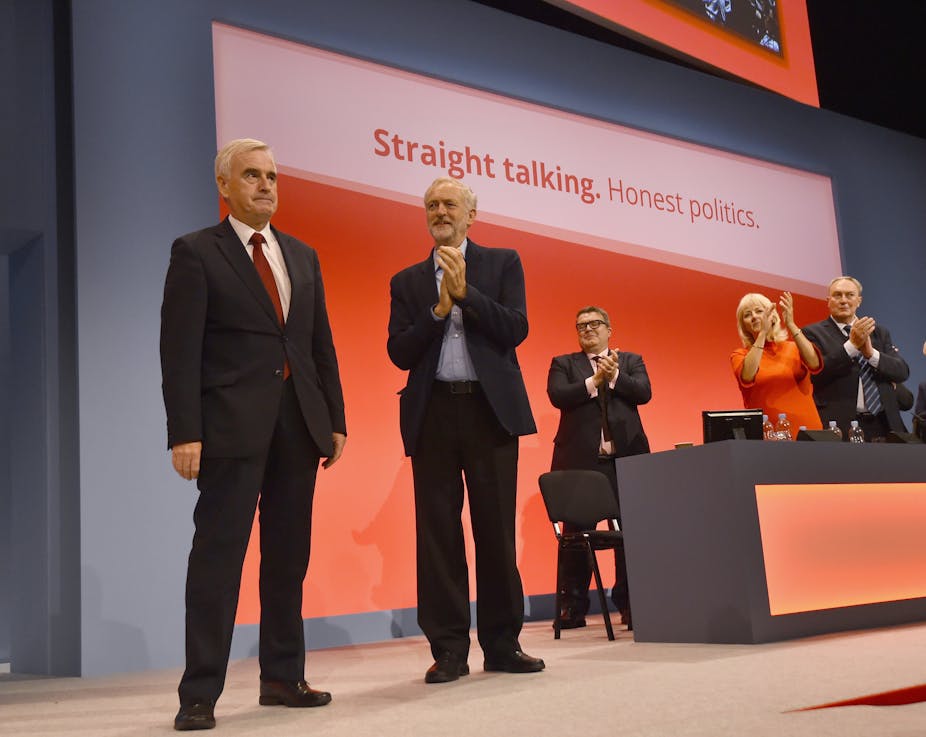John McDonnell’s debut Labour Party Conference speech as shadow chancellor was hugely anticipated by both friends and foes. Would this left-wing firebrand light up conference with his alternative vision of Britain’s economy? How would he convince those outside the hall that he was a man to be trusted, a man with a realistic vision for Britain’s economic future?
Even though he’d only been shadow chancellor for two weeks, McDonnell was nonetheless expected to go beyond generalities and start laying out specific plans. Detailed policies would allow his supporters to rally behind him and counter the criticisms from both inside and outside the Labour party. His opponents hoped that detailed proposals would give them the evidence they needed to paint the Corbyn leadership as a cabal of “loony lefties”.
McDonnell worked hard to squash any expectations that his speech would be incendiary. Instead, he argued it would be fairly bland and boring, nothing extreme, merely the start of a discussion with the electorate well within “new politics” of Corbyn’s leadership.
It seems he was telling the truth. His speech to conference was fairly short, very light on detail, and offered neither supporters nor opponents much to get their teeth into – even as it doubled down on profound changes to the party.
Denying nothing
McDonnell began by highlighting groups which Labour would fight to defend – groups, he argued, the Conservative government had punished in its drive to balance the books. McDonnell argued that the Labour party would defend and protect women, the disabled, and those with housing issues.
But there was no detail on how this would be done, and McDonnell simply moved on to criticising the Conservative government’s record in office. Whereas Ed Miliband tried to brand his approach as “one-nation Labourism”, McDonnell argued that the Conservative version really only represented the richest 1% in society. This was the main theme of McDonnell’s speech – that there was more than one way to tackle the deficit.
His opponents have tried to tar him and his supporters as “deficit deniers”, but McDonnell argued that this wasn’t the case. Instead, he continually stressed that the deficit had to be dealt with, but that the way the Conservative government were approaching the problem was ideologically driven, something Corybn and McDonnell have themselves been accused of.
The speech highlighted a variety of different policies which would have been unthinkable even three months ago for the Labour party leadership. McDonnell argued for a “real” living wage, higher taxation for big companies such as Google and Starbucks, cuts to the corporate welfare system, and rent control.
What was missing was any explanation of how this would be achieved. Conference speeches are often light on detail, as they don’t make the best vehicles for explaining complicated macroeconomics, but this speech was particularly thin. It was essentially a shopping list of things McDonnell wants to see implemented, with no discussion of cost or implications.
Perhaps to take the edge off this dearth of specifics, he has unveiled a small group of economists who would be working with the party to advise them on economic policy, including French academic Thomas Piketty, Nobel prize winner Joseph Stiglitz, Mariana Mazzucato, and Daniel Blanchflower, a former member of the Bank of England Monetary Policy Committee.
Pragmatic idealism
McDonnell then turned his attention to the infrastructure of government, a common complaint for those excluded from power.
MPs such as Richard Crossman in the 1940s and 1950s (before he became a minister in 1964) argued that the infrastructure of government stifled creative thinking and rebellious nature. This speech was a 2015 version, with McDonnell unveiling plans for a review of the Treasury and another review of the Bank of England.
He also announced that a Corbyn government would restore and extend trade union rights and review the mandate of the Bank of England. While independence would still be maintained, the mandate would be extended, forcing the Bank of England to focus on economic growth, employment and earnings. HMRC’s remit would be expanded to gather those taxes from individuals and firms who currently avoid or evade tax.
Yet again, there was no detail as to how this would be achieved, or any explanation of why this supposedly easy money is not currently being collected.
McDonnell concluded by arguing – as Corbyn has since before he was elected leader – that it’s time for Labour to pursue a new type of politics, one free from spin and filled with adult conversations. He argued that socialists of his and Corbyn’s ilk are pragmatic idealists, not frothing fantasists. He called for those who had refused to serve in a Corbyn shadow cabinet to come back to the fold and engage in the new discussion, before concluding with a call for “solidarity”.
The earth did not spin off its axis, the citadels did not fall, and McDonnell’s speech received the usual standing ovation. His supporters received it as a blueprint for a new approach; his detractors deemed it pie in the sky, a return to the bad old days of Labour. Only time will tell if the British public can be convinced.

